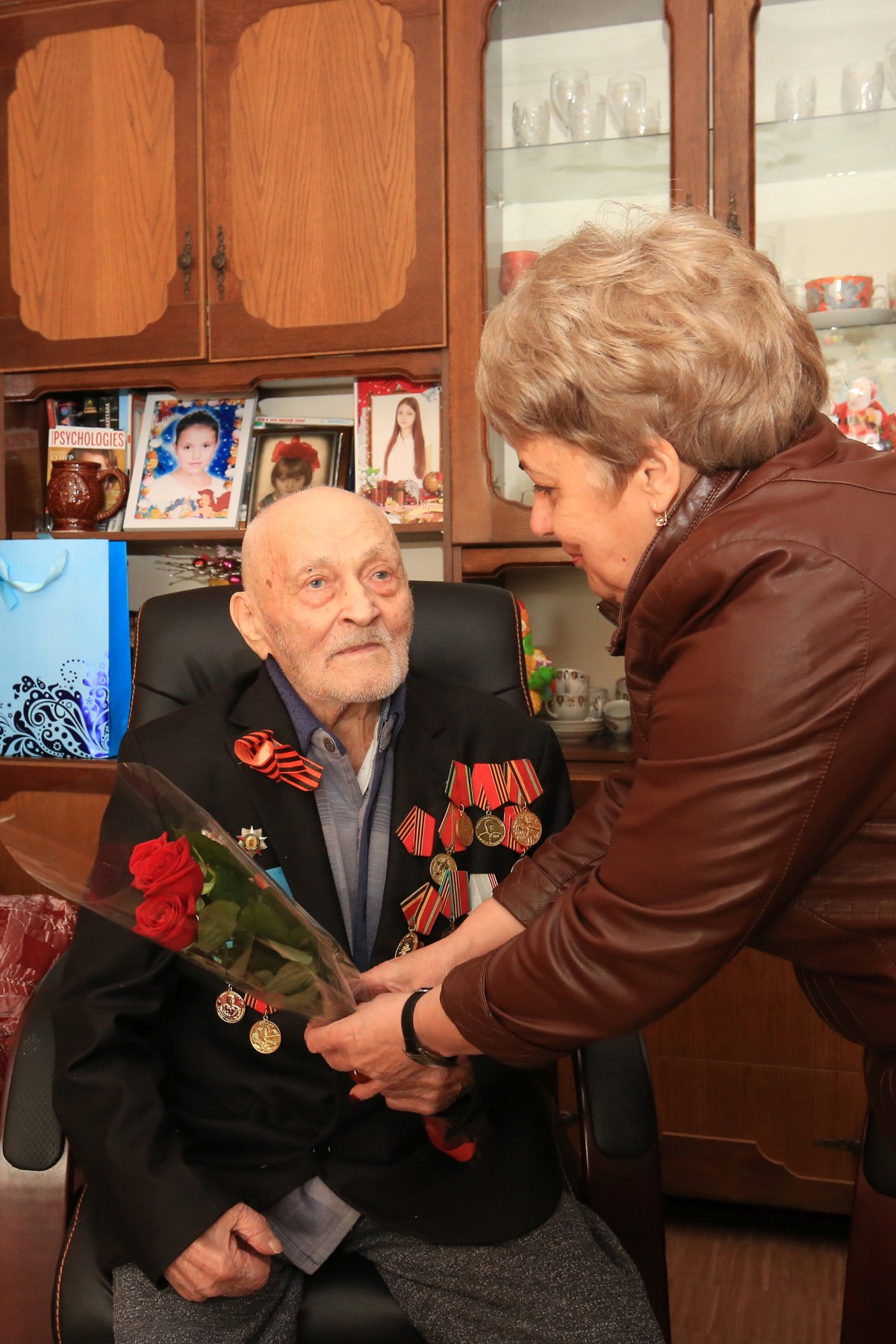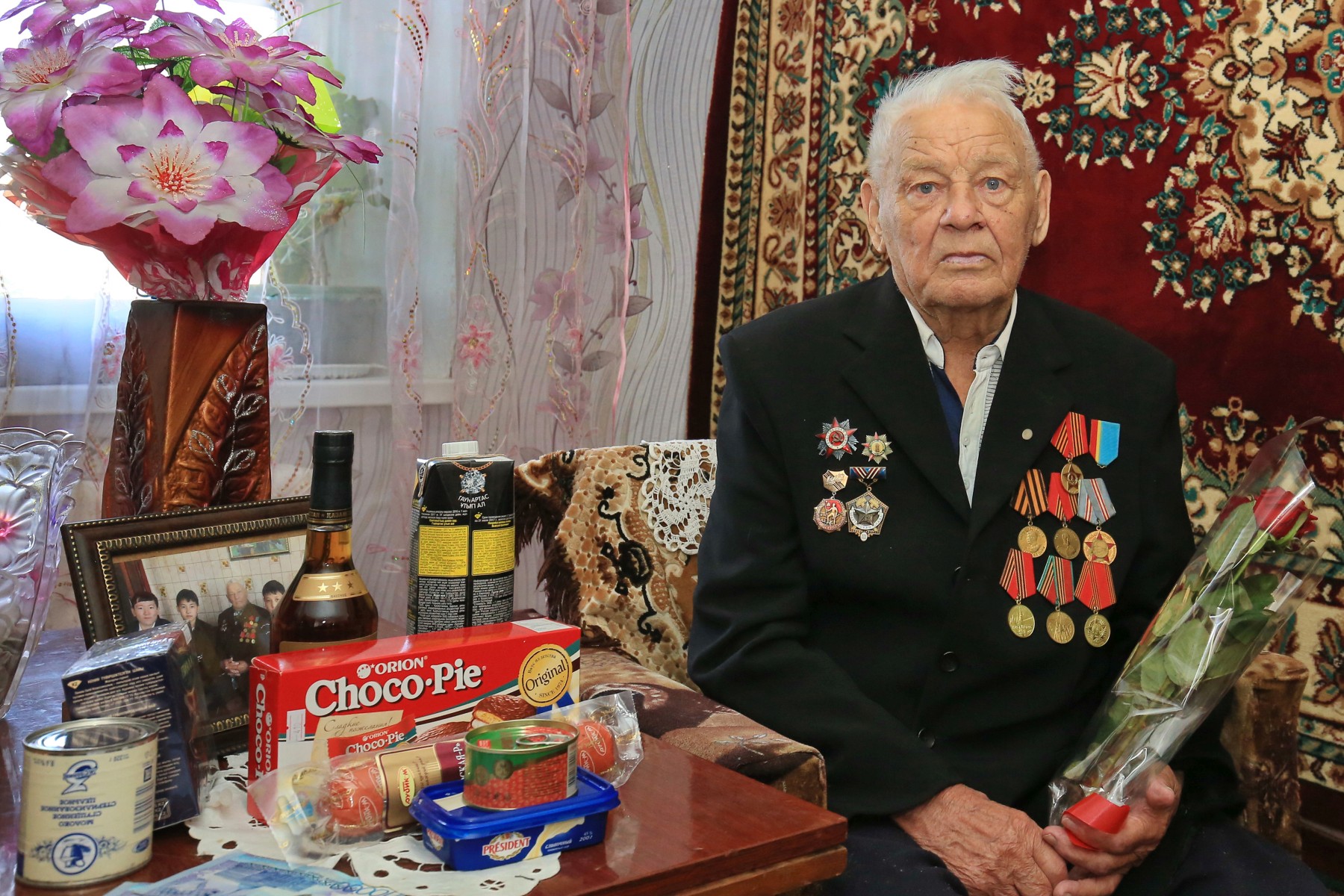Having passed the roads of war
04.05.2017
By the set tradition, on the eve of one of the most significant and truly all-people's holiday - Victory Day - the representatives of Public Fund of Bogatyr Coal LLP visited the veterans-miners, participants of the Great Patriotic War. On behalf of the labor collective of the partnership they congratulated the honored veterans, participants of those past and dramatic events, with the honorable date and presented them the sets with food products, and also cash allowances. The veterans touched by the attention and care expressed the words of sincere thankfulness to Bogatyr employees. Having passed the path of glory today each of the heroes shares his reminiscences on that crucial time for the country with the young generation. Born in Smolensk region Aleksey Demyanovich Perelyakin went to the front in 1942. After graduation of the three-month courses on training mortar men together with other recruits he was directed to building defense works along the Argun river. In some time the newly formed infantry regiment was relocated to timber logging for construction purposes to build defense works for the Soviet spearheads. In the victory year - 1945 - in an atmosphere of strict secrecy their military division was relocated to the Soviet and Chinese border. In the composition of the 1036-th regiment of the 293-rd rifle division Aleksey Demyanovich participated in the war with Japan. This is how he recollects the episodes of his war biography of that period:
- From Chita through Dauria our regiment moved in direction of Manchuria having overcome the extremely difficult crossing through the Great Khingan Mountains. After that there were the difficult battles with the parts of the Japanese Army. I remember we ran into ambush of Japanese combing the area. To liquidate the trap one squadron of sub-machine gunners was enough. Having gone down the highway spiral of the mountain road we revealed in the canons. After that we continued to move in direction of Hailang town, in the suburbs of which the Japanese soldiers were sitting in two fortified earth-fill fire positions. As it turned out the Soviet troops did not reveal the hidden enemy during the march. Meanwhile it started to liquidate systematically and archly our small subdivisions left to support order in the area. We had to neutralize the firing-points of the enemy. We were surprised very much how the Japanese soldiers treated each other on the last days before the capitulation. So, if a white flag on termination of holdout was raised by the soldiers in the first earth-fill firing position then they were brought down with fire by the combat crew of the second fire position, and on the other way round - the attempts to give in without struggle of the second fire position were causing the fierce fire of comrades-in-arms. This is how the Japanese soldiers were sparing at each other until they agreed to give up.
In September 1945 the long-awaited peace came. Japan signed the Pact of Surrender. This is how the World War II finished. Aleksey Demyanovich and his comrades were directed to restore the objects of national economy. Soon he was sent to the hospital - his old wounds reminded on themselves. In half a year - in August of 1946 - Aleksey Demyanovich was transferred to reserve, and he went back to his native place - Novosibirsk region - and then he moved to the Altay region. And in 1966 - to Ekibastuz. He was employed at the coal mine of Irtyshugol trust as Assistant Excavator Operator. He worked in this position until he retired in 1978. For the military service in the years of war Aleksey Demyanovich Perelyakin was awarded with the Award of the Patriotic War of the 2-nd grade, For Victory over Japan Medal, the Great Patriotic War badge, and numerous jubilee medals. The veteran also has labor merit badges: "Winner of the Socialist Competition", "Foreman-Mechanic of the Coal Industry".

Aleksandr Fyodorovich Shchetchikov was born in Mordovia. He was drawn to the color when he was 18 years old after the graduation from the railroad specialized school. He had the accelerated military training in the vicinities of Moscow; by its results he got the specialty of an air agitator and sergeant rank. He took the first baptism of fire at the Kursk Salient in the composition of the air defense gun regiment, he participated in the battles for Kiev, he freed Ukraine, Poland, and Transcarpathia. Sergeant Shchetchikov finished his war path in May of 1945, in the suburbs of Prague. The regiment, in the composition of which he was serving so heroically, was the only one in the division awarded with Order of Red Combat Banner. The service coat of the veteran is decorated with many medals and awards, such as: For Bravery, For Military Merits, For Victory over Germany and many others. In the postwar time Aleksandr Fyodorovich lived and worked at the Far East until he moved to Ekibastuz in 1967. In the miners' town he worked as a foreman, taskmaster for construction at Bogatyr coal mine, shaft-sinker in the shaft-sinking enterprise for many years. Now being a pensioner Aleksandr Fyodorovich Shchetchikov is full of forces and courage, and wishes everybody the same.

Pyotr Vasilievich Koval was drawn to the color when he was a 17-year-old boy - in December of 1944. Before that he had the military training in the Urals. After that in the composition of the 930-th artillery regiment of the 1-st Far East Army was relocated to the Far East, where he participated in the war against the militarist Japan. He met the victory over Japan in the northern Manchuria. And although the military actions against Japan did not last long the young soldier saw all the toils of war in full. In 1946 the soldier Koval was discharged. Pyotr Vasilievich was awarded with the Order of the Patriotic War of the 2-nd grade and medal For Victory over Japan for his courage and heroism demonstrated in the course of military operations. In peaceful time already he worked in the coal industry for over thirty years - he worked at various production sections: as a shunting master, then as an electric locomotive operator. The veteran will meet the forthcoming holiday - Great Victory Day - with his relatives in Moscow.
Kanat ALDABAYEV Photo by Oleg MALCHUK.





